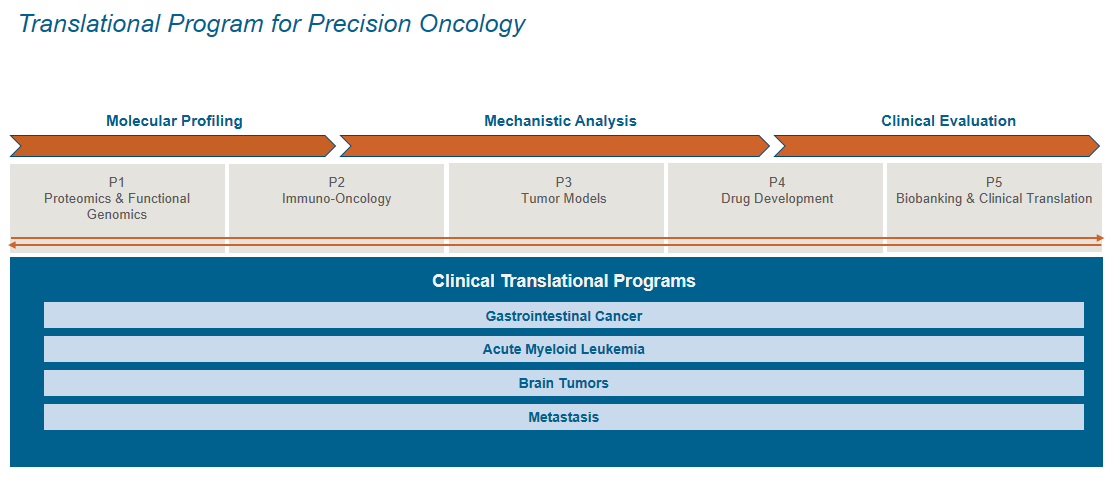Our Precision Oncology Mission
Our main focus of research is translational cancer research with the mission to “turn molecular information into novel cancer therapies” by elucidating molecular mechanisms of cancer development and progression to find novel therapeutic strategies. The ultimate goal is the fast and efficient transfer of promising results from basic research into clinical practice (“from bedside to bench and back”). This process is essential for the UCT Precision Oncology Program and the use of novel personalized medicine approaches in routine cancer treatment.
The overall aim of the UCT Precision Oncology Program is the optimized treatment of cancer patients through advanced molecular diagnostics and individualized targeted therapies based on the molecular results of each patient, thereby also reducing side effects of cancer therapy and improving quality of life. Novel diagnostic and therapeutic approaches are currently being developed jointly by the UCT partners, which will be tested in clinical trials and validated in regional and national research networks such as the national network genomic medicine (nNGM) for lung cancer or the German network for personalized medicine (DNPM). As a result, the recruitment of patients into prospective clinical trials for molecularly stratified therapeutics will be simplified and increased. At the same time, research in personalized oncology and education of physicians and scientists in this field will be fostered. Furthermore, we aim to optimize regional structures for patient care together with partner hospitals and private practices in the region, e. g. through the implementation of joint molecular tumor boards.
Clinical Translational Programs
The translational cancer research in Frankfurt consists of a matrix of programs along cancer entities and technology and infrastructural platforms.

The clinical translational programs of the Frankfurt Cancer Institute (FCI) focus on gastrointestinal cancer, brain tumors, acute myeloid leukemia and metastasis, and are closely connected to the Precision Oncology Mission and the therapeutic spectrum of the UCT, as they have their origin in clinical observations and problems arising in diagnostics and therapy of cancer patients. Thus, these clinical translational programs combine the interdisciplinary expertise in basic and translational cancer research (e.g. functional tumor research with patient biomaterial, development of preclinical and clinical therapeutic strategies or molecular profiling of tumors) with that of clinicians dedicated to patient care at the UCT.
Each of the four clinical translational programs is focused on special entities and is worked on in close collaboration by interdisciplinary teams of physicians, biologists, biochemists, chemists and bioinformaticians within the UCT from basic research partners (e. g. Georg-Speyer-Haus, Edinger Institute, Institute of Pharmaceutical Chemistry), partners of clinical application (e. g. Department of Radiotherapy and Oncology, Dr. Senckenberg Institute of Neurooncology, Department of Pediatrics, Department of Medicine, Dr. Senckenberg Institute of Pathology) and the German Cancer Consortium (DKTK).
The first program focuses on colorectal cancer, in particular on the effective treatment of rectal carcinoma and the validation of results in clinical trials together with the German Rectal Cancer Study Group (GRCSG).
The second program pursues the goal to identify pathophysiological processes of acute myeloid leukemia (AML), e. g. through proteogenomic profiling, to improve molecularly stratified therapies in line with our precision oncology mission.
The third clinical translational program deals with individualized immunotherapeutic approaches in brain tumors and their clinical use, e.g. the further development of novel CAR-NK cell treatments.
A more mechanistic approach is followed by the fourth clinical translational program, which aims to elucidate the signaling cascades of metastasis. In cooperation with the Max Planck Institute for Heart and Lung Research, the investigation of vascular and immunological mechanisms in the key processes of metastasis will provide the basis for individualized, targeted, anti-metastatic therapy approaches with the translational goal of developing clinical therapy trials.





